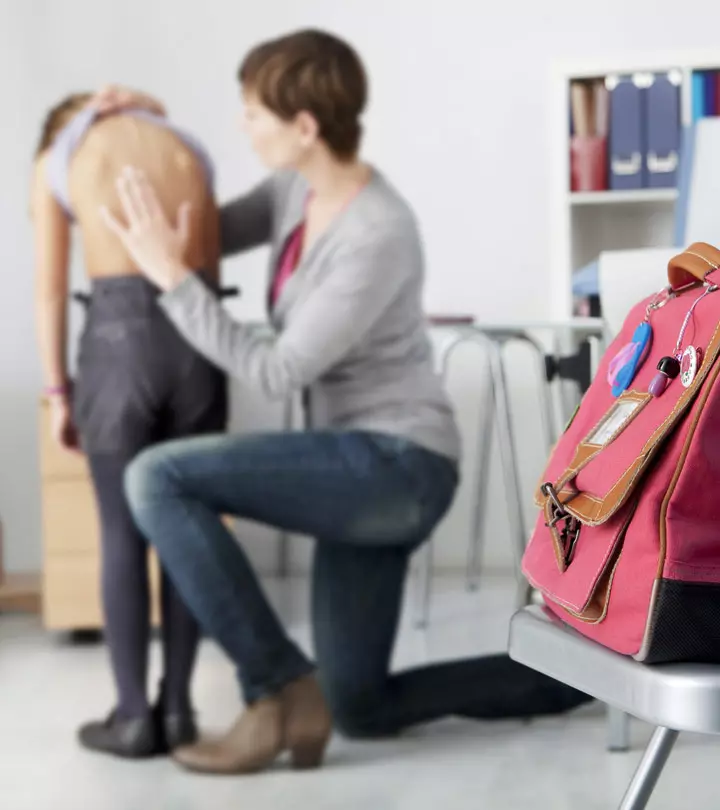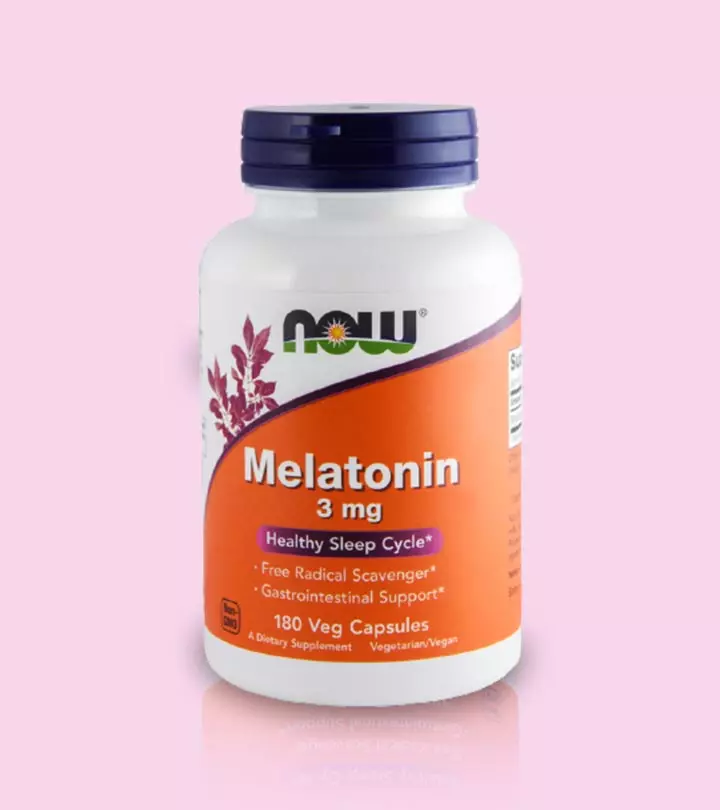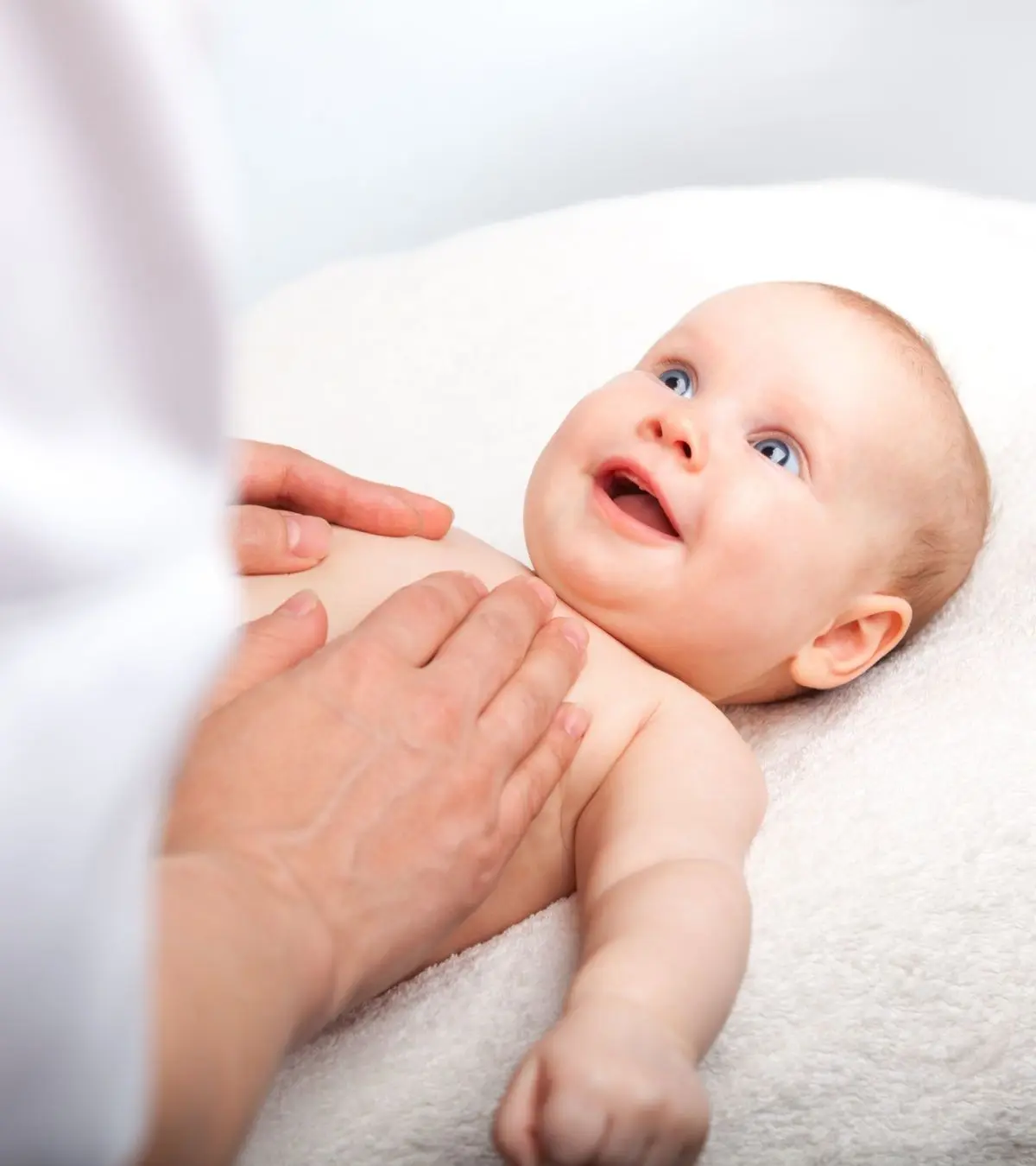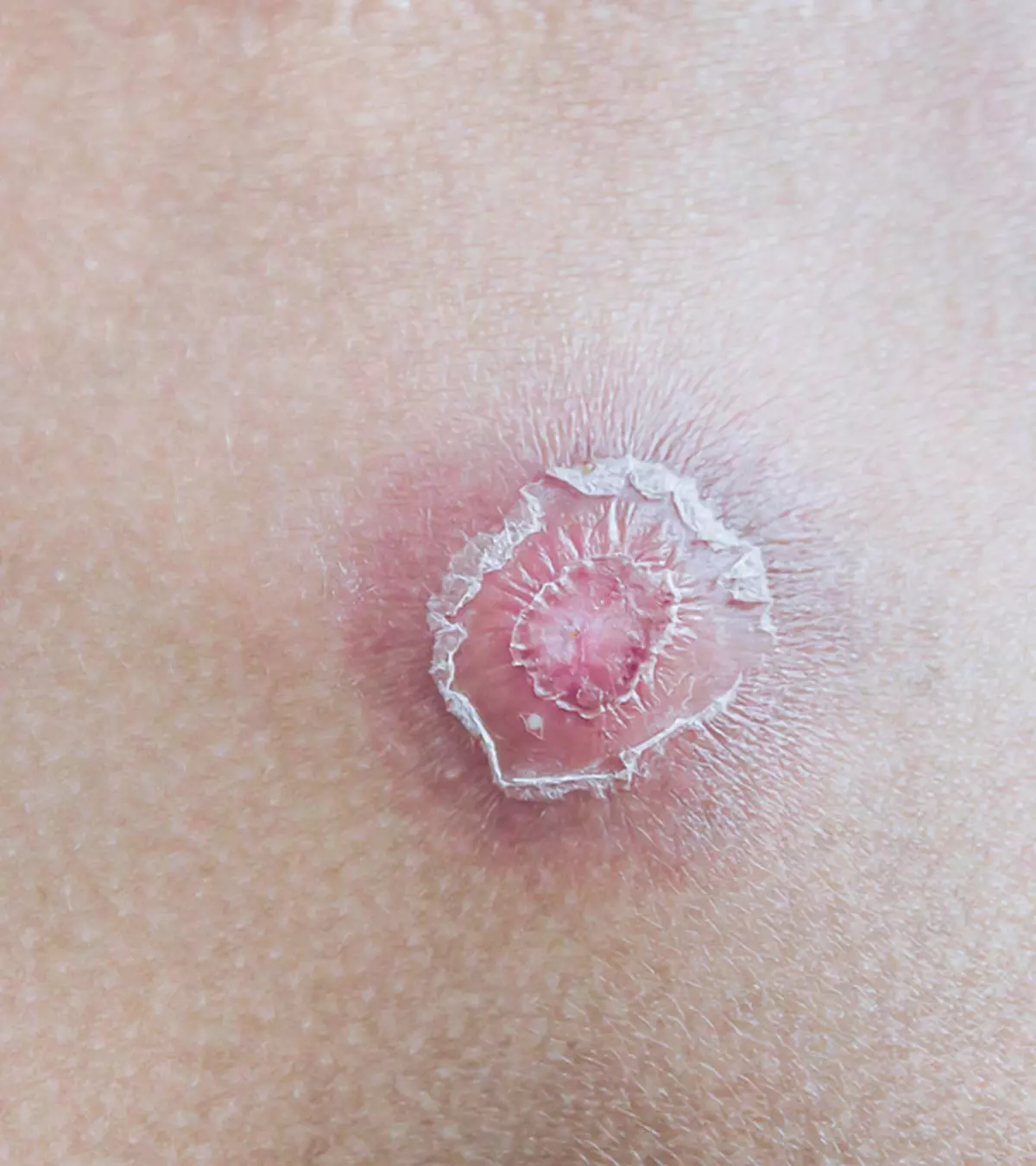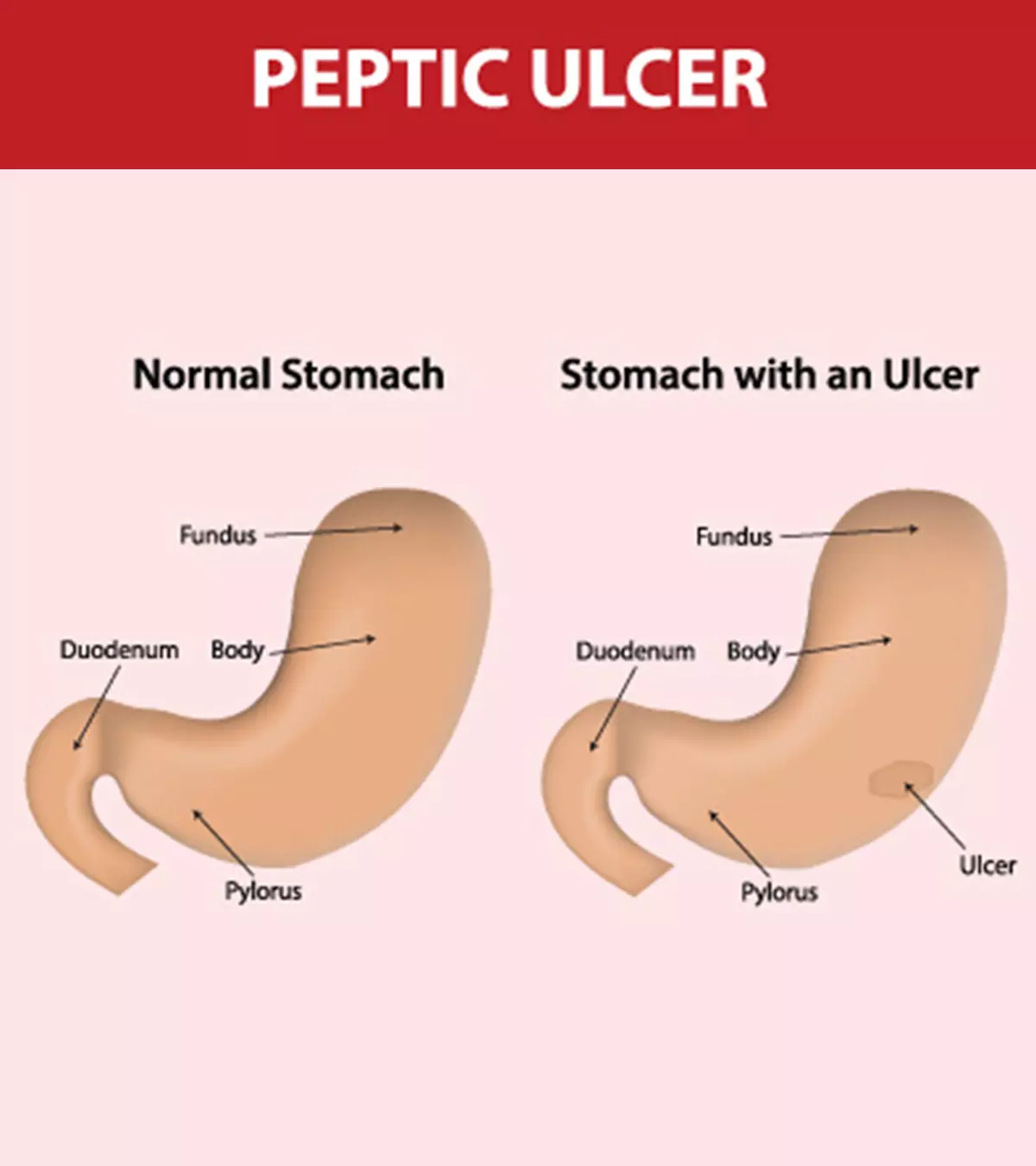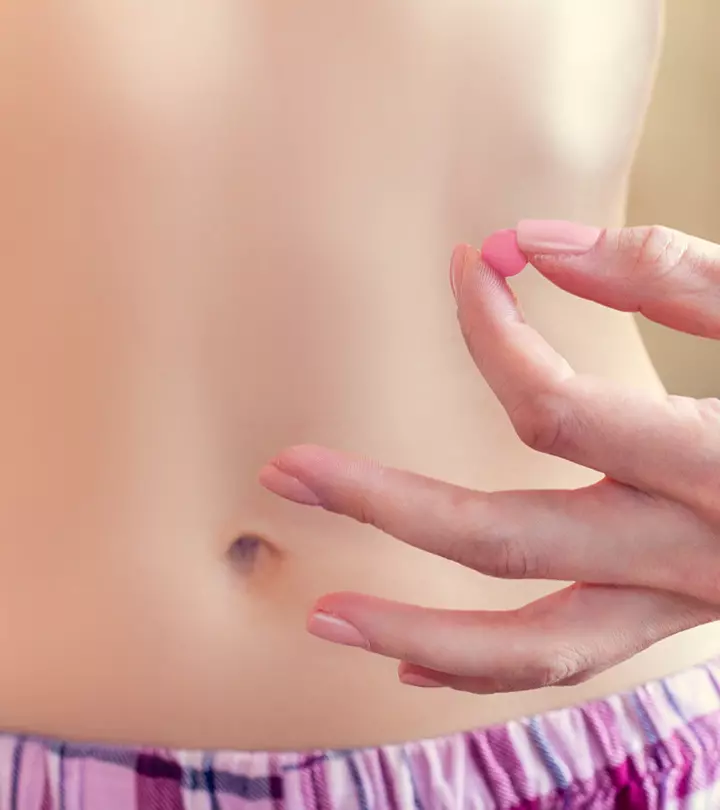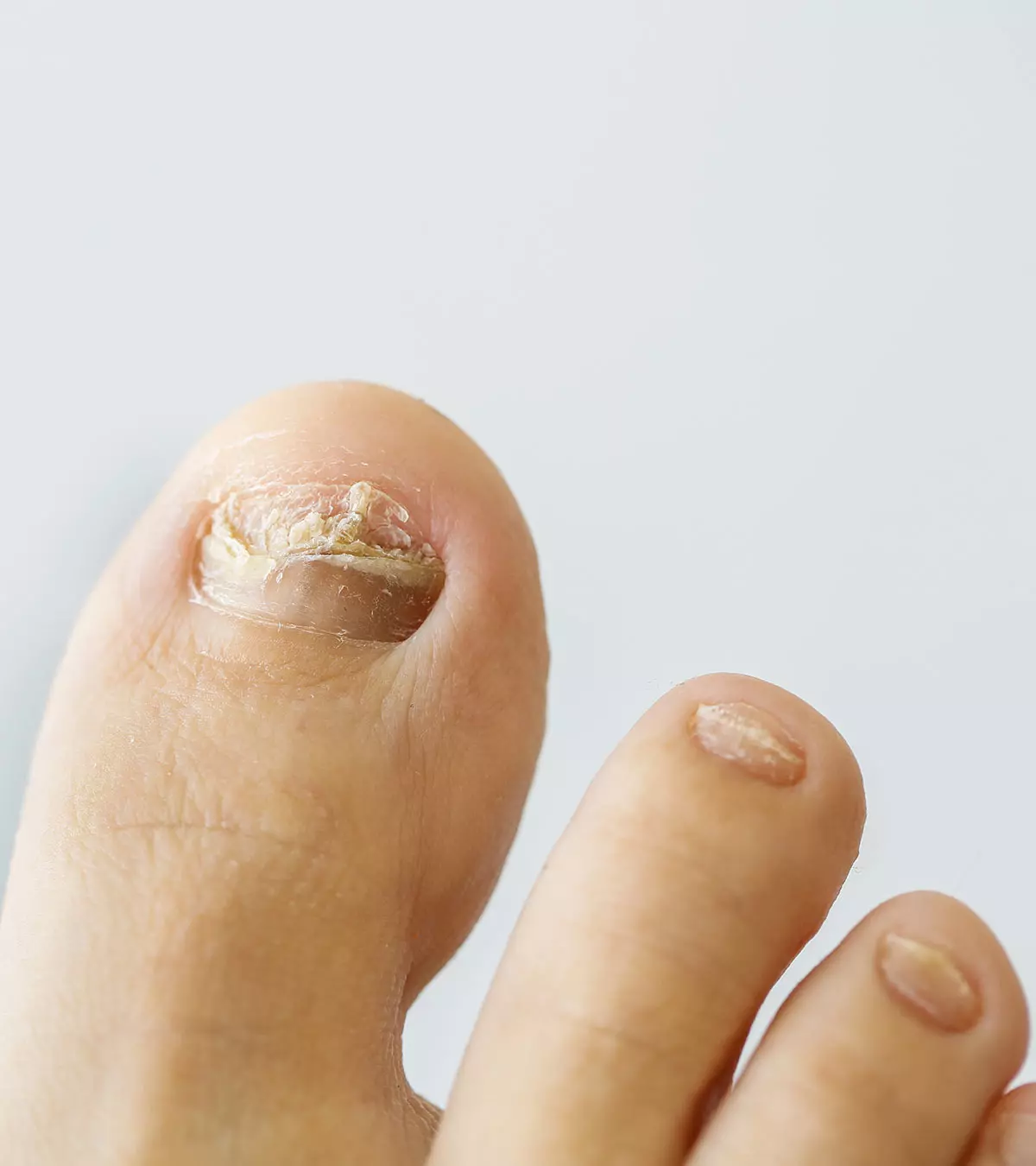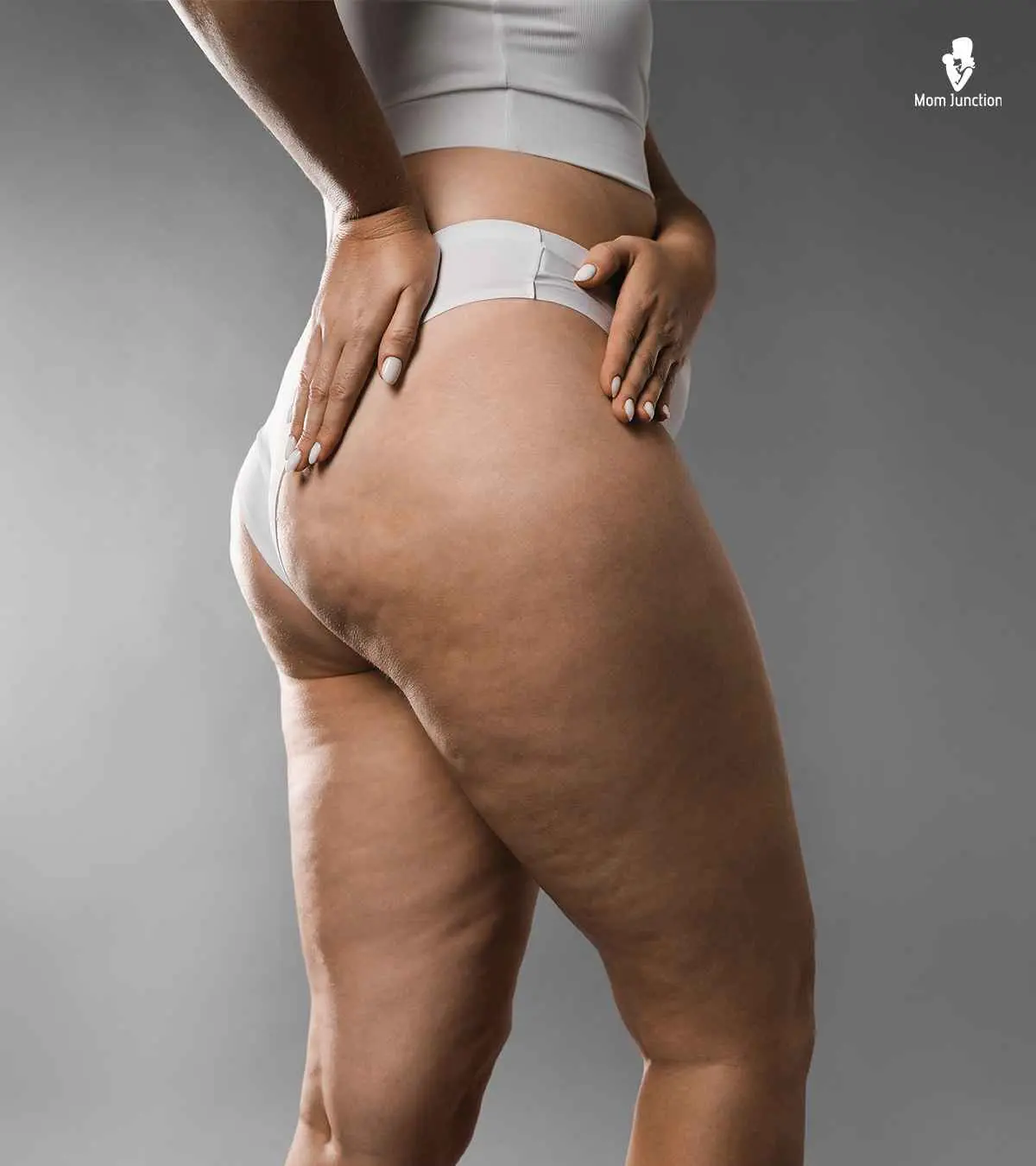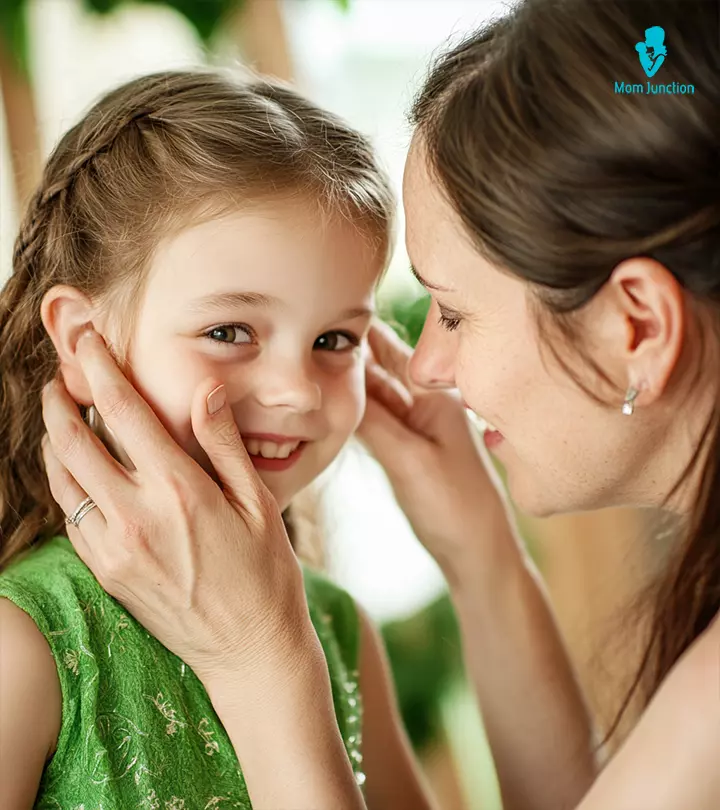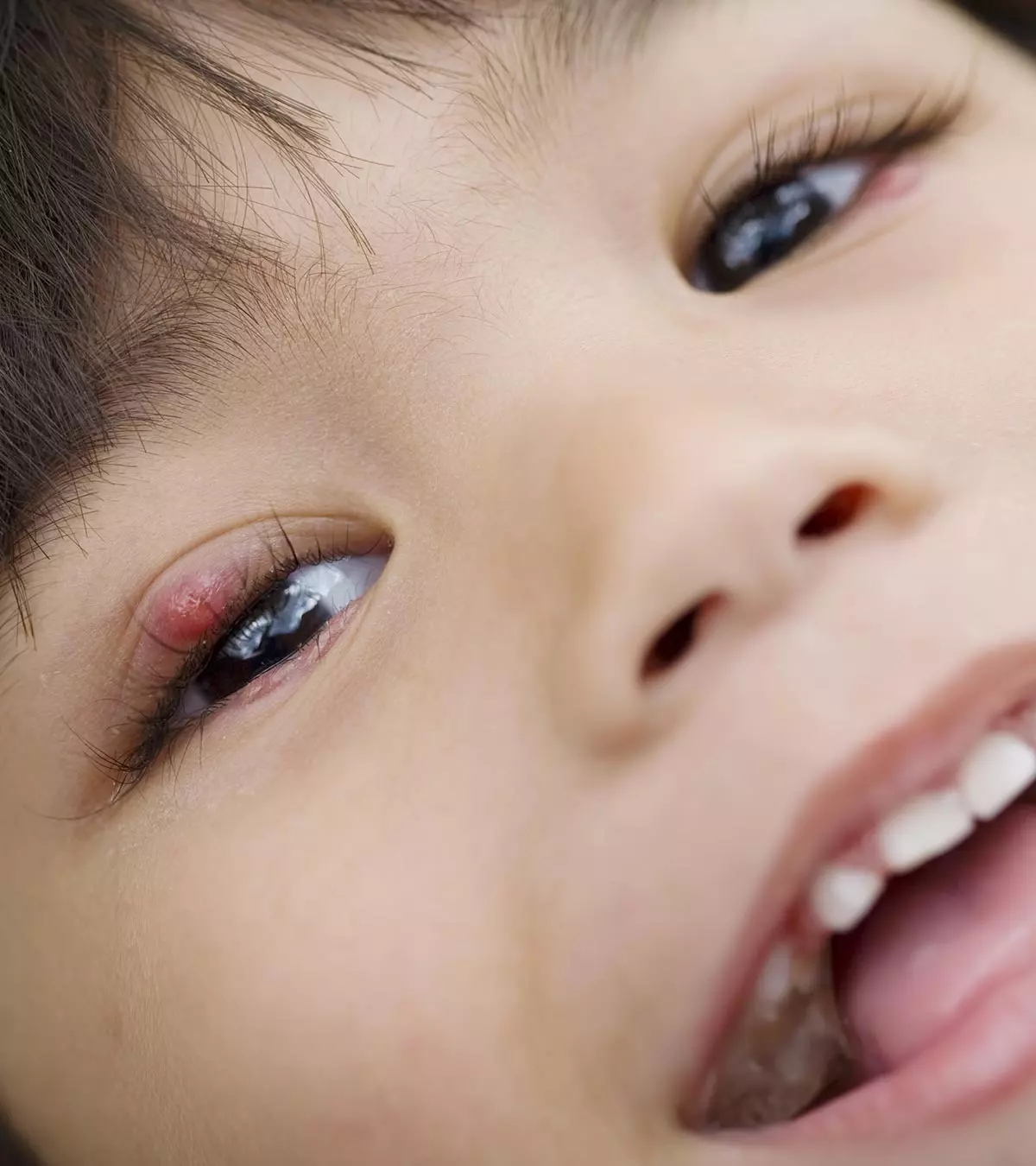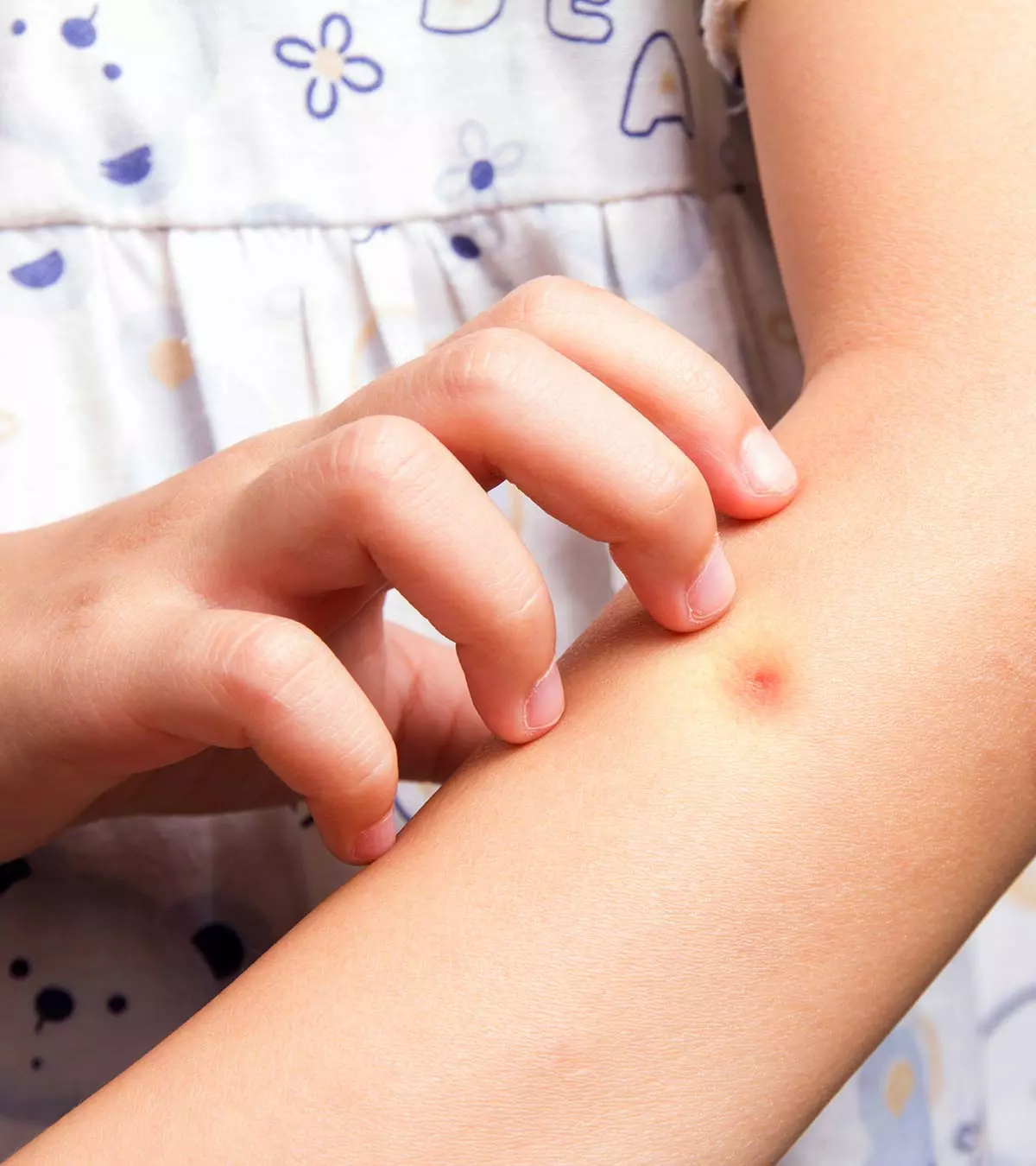
Image: Shutterstock
Mosquito bites in children are more likely to occur than in adults since children tend to be more active outdoors. Several kinds of mosquitoes exist, but only three, Anopheles, Culex, and Aedes, are responsible for human bites and are clinically significant (1).

Female mosquitoes are the only ones that bite since they need blood as a source of iron and protein to nurture their eggs (2). Mosquito bites are generally harmless but can occasionally induce allergic reactions or cause mosquito-borne diseases in children.
Read on to know more about mosquito bites, potential allergic reactions, and preventative strategies for kids.
Key Pointers
- Children are more prone to mosquito bites as they spend more time playing outdoors.
- Mosquito bites can induce itching, red bumps, swelling, and even allergic reactions or diseases.
- Factors such as male gender, warm body temperatures, dark colored clothing, and perfumed products make people more susceptible to mosquito bites.
- To treat mosquito bites in children, one can use an ice pack, antihistamines, hydrocortisone cream, and advise them to avoid scratching the bite.
Symptoms Of Mosquito Bites In Children
When a female mosquito punctures the skin to suck blood, it mixes saliva into our bloodstream. The chemicals in the mosquito’s saliva prevent the blood from clotting and cause an immune response that leads to discomfort, including redness, itching, and swelling (3).
According to the American Academy of Allergy Asthma and Immunology (AAAAI) this contact between the skin and tip of mosquito’s mouth should be for at least six seconds for any reaction to occur (3). A few of the common symptoms of mosquito bites in children include (2) (4).
- Red bumps (raised area where mosquito bit): These itchy red bumps may appear hours or days after a mosquito bite and cause bite marks lasting for a few days.
- Itchy or irritated skin
- Swelling: When a bite occurs on the upper face, it may cause swelling around the eyes that may last for a couple of days. Children between the ages of one to five years may experience swelling that is large and pink in color.
Allergic Reactions And Emergency Symptoms In Children
Allergic reactions from a mosquito bite can vary among children. Usually, people who have become desensitized (less sensitive or insensitive to mosquito bite) may not show any observable reaction (1).
According to AAAAI, young children may not often react at all to mosquito bites for the same reason (3). However, tiny red bumps may appear in some people.
Whereas, others (sensitized) may sometimes present serious reactions to mosquito bites. These reactions may include the following (2) (3).
- Blistering lesions
- Larger hives (a rash of round, red welts on the skin that itch intensely, sometimes with dangerous swelling, caused by an allergic reaction) around the bite along with fever or joint swelling
- Anaphylaxis: Although rare with mosquito bites, anaphylaxis is a life threatening condition characterized by hives, throat swelling, faintness or wheezing.
In many cases, mosquito bites can cause an infection or a disease. You should seek medical attention if your child presents the following symptoms (2).
- Symptoms of anaphylaxis
- Fever
- Headache
- Bodyache
- Rashes
- Nausea
- Eye irritation
- Fatigue or tiredness
Risk Factors For Mosquito Bites
Body odor, heat, light, sweat, carbon dioxide and lactic acid attract female mosquitoes (3). Few factors make people more prone to mosquito bites (2) (4).
- Males are more prone than females
- Warm body temperatures
- Dark colored clothing (especially for the mosquitoes that bite during the daytime)
- Perfumed products including soaps and shampoos
- Breath odors
- Sweat
- Playing near stagnant water
- Blood type: A study showed that people with blood group O attract more Aedes albopictus mosquitoes than A, B, and AB blood group (5).
Complications Of Mosquito Bites In Children
Mosquitoes act as vectors (carriers) of several diseases including (6) (7):
- Chikungunya: A viral condition that spreads from being bitten by an infected Aedes mosquito. The symptoms of this condition develop three to seven days following a bite and gain in severity for a week, after which the effects may last for months (18).
- Malaria: A condition caused by the bite of female Anopheles mosquitoes carrying the P. falciparum parasite, which affects the liver and red blood cells (19).
- Dengue: A viral infection that onsets within a four to ten-day incubation period following an infected Aedes mosquito bite. The infected person may recover within three to seven days. However, in severe cases, lasting complications such as shock, fluid accumulation, respiratory distress, severe bleeding, and organ impairment may occur (20).
- Zika fever: It is caused by the Zika virus, which transmits from the bite of an infected Aedes mosquito. Symptoms are similar to those of dengue. Severe cases may cause complications, including those of the immune system (21).
- West Nile fever: A condition caused by the West Nile virus transmitted through the bite of a Culex mosquito. Two to fourteen days following the bite, symptoms such as fever, headaches, eye and muscle pains, diarrhea, rash, nausea, swollen lymph nodes, and sore throat can occur in one of five infected cases. In rare cases, this virus can cause encephalitis and meningitis (22).
- Yellow fever: Yellow fever is caused by the yellow fever virus transmitted through the bite of an infected Aedes mosquito with an incubation period of 3 to 6 days. People infected by the virus may present with mild symptoms for three to four days, after which they may either recover or enter a toxic stage with more severe symptoms. However, yellow fever is vaccine-preventable. The World Health Organization says, “The vaccine provides effective immunity within 10 days for 80–100% of people vaccinated, and within 30 days for more than 99% of people vaccinated (23).”
- Encephalitis: Encephalitis refers to brain inflammation, which can occur as a complication to infection by viruses, including Flaviviruses, such as the dengue virus transmitted by mosquitoes. Encephalitis itself can cause severe complications such as seizures and coma (24).
In addition, complications may arise due to mosquito bites and other insect bites. These can include the following (1) (4).
- Skeeter syndrome: Some children may develop Skeeter syndrome following a mosquito bite. It is a rare inflammatory reaction to the mosquito’s saliva. The symptoms can include a large area of swelling, redness, heat, and itching or pain (8).
- Impetigo: It is a contagious bacterial skin infection that most commonly affects children between two and five years (9). It is caused by picking and scratching the itchy skin at the site of the bite. It can result in soft scabs, pus, or sores. According to a National Institute of Health (NIH) survey, impetigo accounts for approximately ten percent of skin issues in the pediatric population.
- Cellulitis: This condition is also a bacterial infection that spreads to the skin. Symptoms can include redness, pain, heat, swelling on the skin along with blisters or bruises (10).
- Lymphangitis: This bacterial infection can spread to the lymph channels. The most common symptom is a red line on the skin that goes up the arm or leg. In some cases, the infection may spread into the bloodstream, causing sepsisiA condition in which an infection starts a reaction in the body, causing multiple organ failure, difficulty breathing, fever, and confusion in more severe cases.
Treatment For Mosquito Bites In Children
Usually, a local reaction from mosquito bites resolve on their own within 10 days (1). In addition, if symptoms of anaphylaxis appear, seek immediate medical treatment. However, mosquito-borne diseases may require medical attention.
The following tips can help relieve the symptoms of mosquito bite in toddlers and children when the reaction is localized (2) (3).
- Ice pack: Elevating the affected area and applying ice packs can help reduce swelling and pain.
- Cleaning the blisters: Cleaning the blisters with soap and water without breaking them will help reduce itching and infection.
- Over-the-counter lotion: Applying an over-the-counter lotion to the affected area can also help to reduce symptoms.
- Topical steroids or oral antihistamines: In cases where itching persists, topical steroids, anti-itch creams, and oral antihistaminesiMedications that help relieve allergic symptoms can be recommended.
Loratadine, an antihistamine has been shown to reduce skin reaction symptoms, especially in children (11). Use of hydrocortisone cream is not recommended in children.
Overuse of anesthetics or antihistamines should be avoided in children as it may cause side effects over a longer period of time.
- Autoinjectable epinephrine: In case your child has been diagnosed with insect anaphylaxis, doctors can recommend carrying autoinjectable epinephrine.
Epinephrine works by reversing the symptoms of anaphylaxis. For example, a person’s blood pressure plummets during an anaphylactic reaction because the blood vessels relax and dilate – epinephrine causes the blood vessels to constrict, which raises blood pressure.
 Quick tip
Quick tipHome Remedies For Mosquito Bites In Children
You may also try the following home remedies to relieve itching and swelling. However, if your child shows other symptoms such as fever, blisters, rashes, bodyache, or nausea, you should seek immediate medical attention.
- Oatmeal: Oatmeal has been used for ages for its anti-itch and anti-inflammatory properties. Certain chemical compounds (avenanthramides) in oats work as an anti-irritant (12). Therefore, a warm oatmeal bath or oatmeal paste may help relieve the symptoms of mosquito bite.
- Vinegar: Dabbing a drop of vinegar on a mosquito bite can help reduce itching. With its natural disinfectant properties, it can work against skin irritation. Using a washcloth soaked in cold water and vinegar solution can also provide more relief.
- Baking soda: A solution of baking soda (sodium bicarbonate) and water can also ease the itchiness from a mosquito bite (25).
- Aloe vera: Aloe vera gel has been known to show anti-inflammatory action. Therefore, applying the gel directly to the site of mosquito bite can help relieve the symptoms (26).
- Basil: A chemical compound, eugenol, in basil has been known to be effective against itchy skin. Basil leaves boiled in water or as paste can, therefore, be used to provide relief from mosquito bites. You may even consider using basil essential oil to relieve swelling (26).
- Honey: With its antibacterial and anti-inflammatory properties, honey can be used on the itchy mosquito bite (26).
- Thyme: Thyme is known to have antibacterial and antifungal properties. Its leaves, made into a paste or essential oil extract, can be used against mosquito bites to relieve itching and skin irritation (26).
- Onions: Onions contain a powerful anti-inflammatory plant pigment called quercetin, which can help relieve mosquito bites. You may directly apply a slice and rinse the area afterward (26).
- Garlic: Garlic contains the compound allicin, which is known for its antiseptic and antibacterial properties. It can help soothe inflammation due to mosquito bites. Crushed garlic can be applied to the affected area or applied after mixing it with coconut oil (26).
 Quick tip
Quick tipPreventing Mosquito Bites In Children
Prevention is better than cure! You may follow these tips to keep your child safe from mosquito bites (13) (27).
1. Getting rid of mosquito breeding areas
Maintain a clean environment by removing stagnant water from old tires, toys, buckets, rain gutters, plastic covers, flower pots, kiddie pools, or any other container to prevent mosquito breeding. Additionally, regularly clean bird baths and swimming pools to eliminate mosquito eggs and larvae. Also, cover storage water tanks, cisterns, rain barrels, and buckets with tight lids to prevent mosquitoes from entering.
2. Using recommended pesticides
Use safe pesticides and larvicides to control mosquito larvae growth outside the house. Pick pesticides meant for domestic use at home. Make sure to follow the instructions and precautions mentioned on the pesticide container.
3. Using mosquito barriers
Keep your doors, windows, and open spaces covered or closed with mesh, and use air conditioners whenever possible. Cover children’s beds with mosquito nets for their safety.
4. Avoiding mosquito bites
Mosquito bites can be avoided by staying indoors during peak mosquito activity times. Make children wear clothes that cover normally exposed body parts, such as pants, full-sleeve garments, and socks to minimize bite sites. According to the Centers for Disease Control and Prevention, using clothing that is treated with 0.5% permethrin can help prevent mosquito bites. You may either purchase such insect-repelling apparel or treat them yourself (28). Further, use an Environmental Protection Agency (EPA)-approved mosquito repellent such as DEET (diethyltoluamide) (29).
 Point to consider
Point to considerWhen to see a Doctor
Seek immediate medical help if your child experiences following symptoms (4).
- The redness or red streak is spreading along with fever.
- Your child looks sick.
- Pain or redness is spreading 24 hours after the bite.
- Pain and redness has increased 48 hours after the bite.
- Fever
- The swelling gets larger or is filled with pus and has no relief from antibiotic ointment.
- Severe itching that hasn’t improved in 24 hours after the use of steroid cream.
- Symptoms of anaphylaxis such as faintness, dizziness, swollen throat, and fever appear.
Frequently Asked Questions
1. How long do mosquito bites last in children?
Most mosquito bites may cause itching for three or four days, and the swelling may last up to seven days (16).
2. How often should I apply insect repellent to my child?
According to the American Academy of Pediatrics, insect repellents such as DEET should only be applied once a day. They should be applied on the outside of your child’s clothing and on exposed skin and not underneath clothing. Ensure you get your children to wash their skin with soap and water to remove any repellent once indoors. Wash their clothing to remove any chemical residues (17).
Mosquito bites are relatively harmless. However, in some cases they may cause allergic reactions. Protecting your child is the best defense. If your child shows symptoms of a mosquito bite along with fever, malaise, increasing pain, puffiness, or redness, make sure to seek medical advice.
Infographic: How To Treat Mosquito Bites In Children At Home?
Mosquito bites are a typical issue for children during the warmer months of the year. Although they usually pose no major health risks, the bites can irritate and make them uncomfortable. While there are many lotions to protect, check out the infographic below for some home remedies.
Some thing wrong with infographic shortcode. please verify shortcode syntax
Mosquitoes are disliked worldwide. They are pesky pests that are found all over, especially in damp and warm regions. Watch this informative video that explains exactly why mosquitoes bite us and also pick up a few tips and tricks on how to keep mosquitoes at bay.
References
1. Seda, J., Horrall, S. Mosquito Bites: StatPearls Publishing LLC. (2019).
2. Mosquito Bites: Cleveland Clinic. (2018).
3. Take a bite out of mosquito stings: American Academy of Allergy Asthma and Immunology. (n.d.).
4. Mosquito Bites: Children’s Colorado Hospital. (n.d.).
5. Shirai, Y., Funada, H., Takizawa, H., Seki, T., Morohashi, M., & Kamimura, K. Landing preference of Aedes albopictus (Diptera: Culicidae) on human skin among ABO blood groups, secretors or nonsecretors, and ABH antigens: Journal of medical entomology, 41 (4), 796-799. (2004).
6. Mosquito Bites: U.S. National Library of Medicine. (2019).
7. Mosquito-borne diseases: Baylor College of Medicine. (n.d.).
8. Skeeter syndrome definition: American Academy of Allergy Asthma and Immunology. (n.d.).
9. Cole, C., & Gazewood, J. D. Diagnosis and treatment of impetigo: American family physician, 75(6), 859-864. (2007).
10. Cellulitis in children: Stanford Children’s Health. (n.d.).
11. Karppinen, A., Kautiainen, H., Reunala, T., Petman, L., Reunala, T., & Brummer‐Korvenkontio, H. Loratadine in the treatment of mosquito‐bite‐sensitive children: Allergy, 55(7), 668-671. (2000).
12. Sur, R., Nigam, A., Grote, D., Liebel, F., & Southall, M. D. Avenanthramides, polyphenols from oats, exhibit anti-inflammatory and anti-itch activity: Archives of Dermatological Research, 300(10), 569. (2008).
13. Tips to prevent mosquito bites: United States Environmental Protection Agency. (n.d.).
14. What parents need to know about insect bites and stings: Children’s Minnesota
15. Mosquitoes are seeing red: Why new findings about their vision could help you hide from these disease vectors: University of Washington
16. Mosquito bite: Children’s Hospital Colorado
17. Choosing an Insect Repellent for Your Child: American Academy of Pediatrics
18. Chikungunya; Cleveland Clinic
19. How Malaria Spreads; Centers for Disease Control and Prevention
20. Dengue and severe dengue; World Health Organization
21. Zika Virus; Cleveland Clinic
22. West Nile Virus; Cleveland Clinic
23. Yellow fever; World Health Organization
24. Encephalitis; National Institute of Neurological Disorders and Stroke
25. Insect Bite; Seattle Children’s Hospital
26. The Best Ways to Avoid a Mosquito Bite & How to Recover Quickly; Unity Point Health
27. Mosquito Control at Home; Centers for Disease Control and Prevention
28. About Permethrin-Treated Clothing and Gear; Centers for Disease Control and Prevention
29. About Mosquito Bites; Centers for Disease Control and Prevention
Community Experiences
Join the conversation and become a part of our nurturing community! Share your stories, experiences, and insights to connect with fellow parents.
Read full bio of Dr. Atiqur Rahman Khan
Read full bio of Dr Bisny T. Joseph
Read full bio of Swati Patwal
Read full bio of Anindita Ghatak







